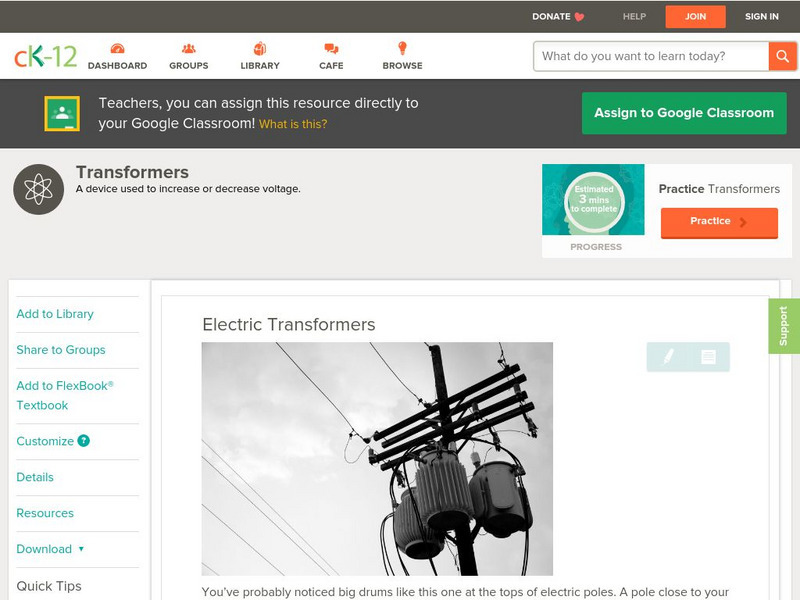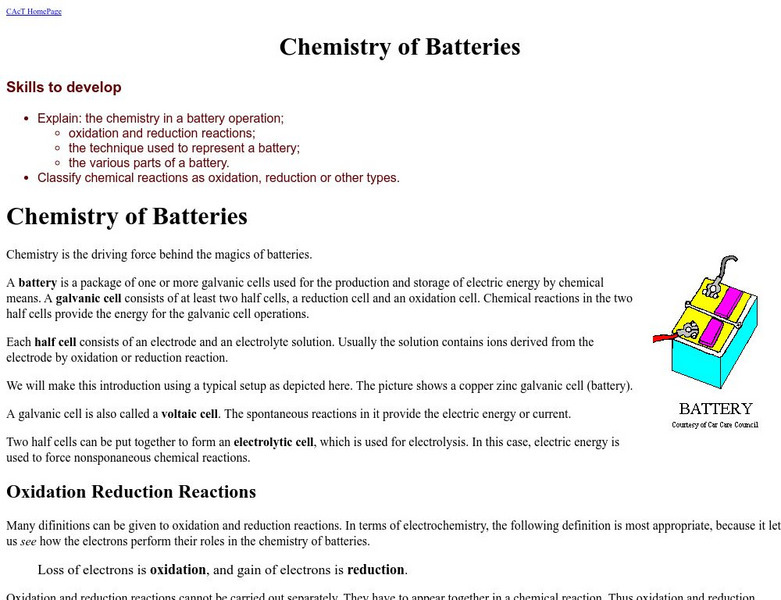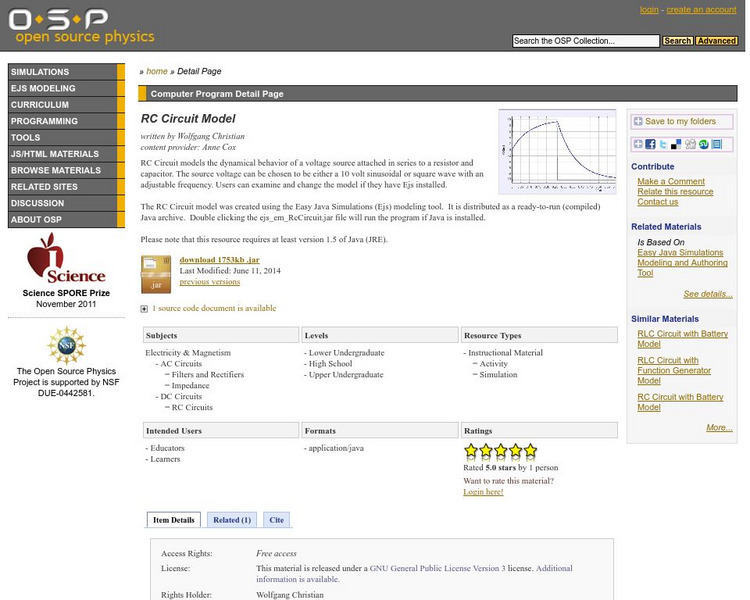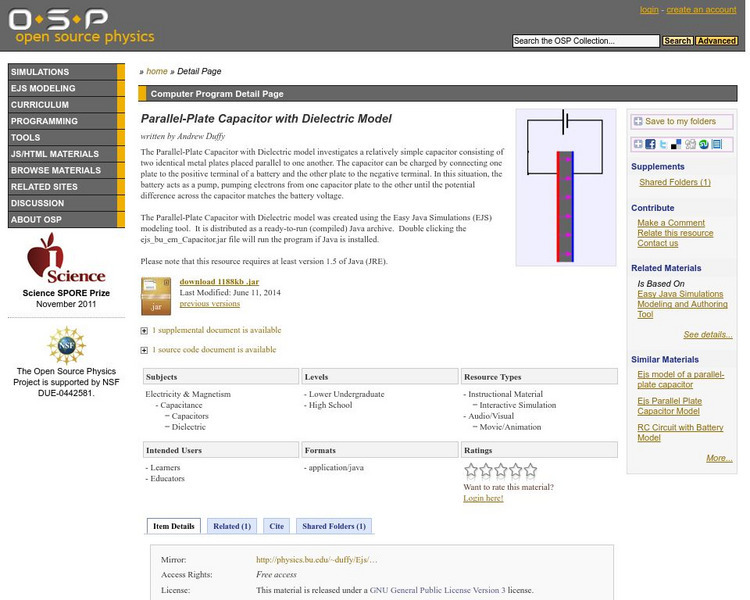Hi, what do you want to do?
Concord Consortium
Concord Consortium: Stem Resources: Wind Generator
Using a voltage sensor, students will measure how much "electricity" is produced by the wind turbine that they design and build. Students will experiment with blade designs to see which one collects energy from the wind the most...
Concord Consortium
Concord Consortium: Stem Resources: Electric Current
In this interactive, students can explore how current, voltage, and resistance are related in a model showing the flow of electrons in an electric circuit. They will learn about Ohm's law and how other forms of energy can be made from...
Wolfram Research
Wolfram Science World: Capacitor
A rather mathematical explanation of a capacitor. Gives all the appropriate formulae, with many hotwords for further info.
CK-12 Foundation
Ck 12: Physical Science: Electric Transformers
[Free Registration/Login may be required to access all resource tools.] Discusses how an electric transformer works and step-up and step-down transformers.
ClassFlow
Class Flow: Electricity
[Free Registration/Login Required] Students can use this Flipchart to learn and apply Ohm's law to basic circuitry problems. Students are introduced to the relationship among voltage, current, and resistance, and then apply their newly...
University of Waterloo (Canada)
Computer Assisted Chem. Tutorial/chemistry of Batteries
A superb explanation of how a battery works. Discusses the associated chemistry which explains how a battery produces a voltage. Includes a series of "Confidence Building Questions."
Khan Academy
Khan Academy: Electrical Engineering: Introduction
Some basic concepts to introduce the electrical engineering course. Become familiar with engineering numbers and notation, and learn about the two most important electrical quantities: current and voltage.
Khan Academy
Khan Academy: Electrical Engineering: Electrostatics
Electrostatics is the study of forces between charges, as described by Coulomb's Law. We develop the concept of an electric field surrounding charges. We work through examples of the electric field near a line, and near a plane, and...
Howard Hughes Medical Institute
Hhmi: Biointeractive: The Virtual Neurophysiology Lab
Investigate the nervous system by looking at nerve cells in this virtual lab. This lab exercise allows students to experience a virtual dissection of a leech to use electronic equipment to explore the electrical activity of nerve cells....
American Association of Physics Teachers
Com Padre Digital Library: Open Source Physics: Rc Circuit Model
An electrical circuit simulation modeling the behavior of a voltage source attached in a series to a resistor and capacitor.
American Association of Physics Teachers
Com Padre Digital Library: Open Source Physics: Parallel Plate Capacitor
A simulation investigating a parallel-plate capacitor which is charged by connecting one plate to the positive end of a battery, and the other plate to the negative end. The battery sends electrons from one capacitor plate to the other...
American Association of Physics Teachers
Com Padre Digital Library: Open Source Physics: Electric Multipole Field Model
Simulation demonstrating how a point charge, a dipole, or a quadrupole shows field vectors or voltage. Change the charge and see the electric field direction and magnitude, and then record the detector values using a built-in data...
Science Struck
Science Struck: What Is a Plasma Ball and How Does It Work?
Explains how a plasma ball works. It is based on a lamp invented by Nikola Tesla. One needs to be aware of health hazards associated with them. The article includes some amusing tricks that can be done safely with a plasma ball.
National Institutes of Health
National Library of Medicine: Electricity, Frankenstein, & the Spark of Life
Using an online exhibition, investigate how Mary Shelley's horror science fiction story, Frankenstein, reflects the knowledge and studies of electricity, and how those fictional ideas are used in modern medicine.
Ducksters
Ducksters: Physics for Kids: Electricity Glossary and Terms
Kids learn about electricity glossary and terms in the science of physics. Words and definitions you need to know such as current, voltage, resistance, and more.
Ducksters
Ducksters: Physics for Kids: Ohm's Law
Kids learn about Ohm's law in the science of electricity and physics including current, resistance, voltage, example problems, and V=IR.
Georgia Department of Education
Ga Virtual Learning: Steady State Direct Current With Batteries & Resistors Only
In this interactive tutorial, students will analyze series circuits and parallel circuits along with complex circuits composed of elements in series and parallel. Learners will use schematics to help them understand these circuits....
American Association of Physics Teachers
Com Padre Digital Library: Open Source Physics: Ejs Photoelectric Effect
Experience the photoelectric effect by choosing different light frequency, voltage, and metals to stop current from flowing in a circuit.
Curated OER
Science Kids: Science Images: Tesla Coil
An impressive photo showing a high voltage discharge during a Tesla coil demonstration.
Curated OER
Science Kids: Science Images: Overhead Powerlines
This photo looks up at the imposing structure of high voltage overhead powerlines. These structures are common all over the world as they have the important job of holding up the huge lengths of powerlines that carry electricity from the...
Khan Academy
Khan Academy: Application of the Fundamental Laws
We solve a circuit by direct application of the fundamental laws: Apply element laws (Ohm's Law and the like) plus Kirchhoff's Laws to solve for the currents and voltages of a circuit.
Khan Academy
Khan Academy: Electrical Engineering: Circuit Analysis
Circuit analysis is the process of finding all the currents and voltages in a network of connected components. We look at the basic elements used to build circuits, and find out what happens when elements are connected together into a...
Khan Academy
Khan Academy: Resistors in Series and Parallel Review
Review how to find the equivalent resistance for resistors in parallel and series configurations. Recall the current and voltage properties of series and parallel configurations of resistors.
Georgia Department of Education
Ga Virtual Learning: Electric Fields and Electric Potential
In this interactive lesson unit, students will learn about electric fields and charge density. They will explore electric field diagrams and learn how they are used, as well as discover electrostatic potential energy and how it relates...
























